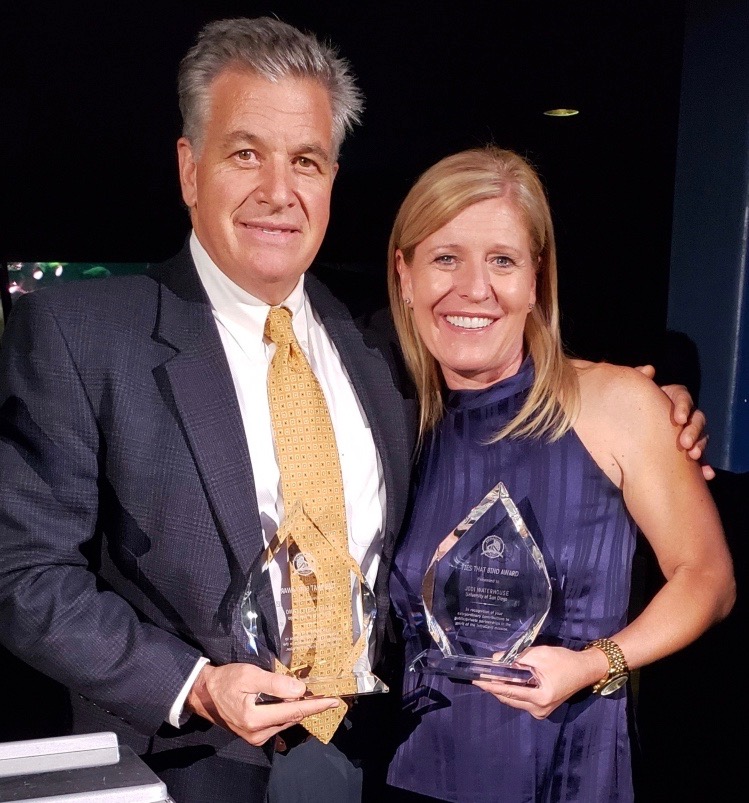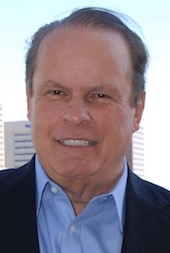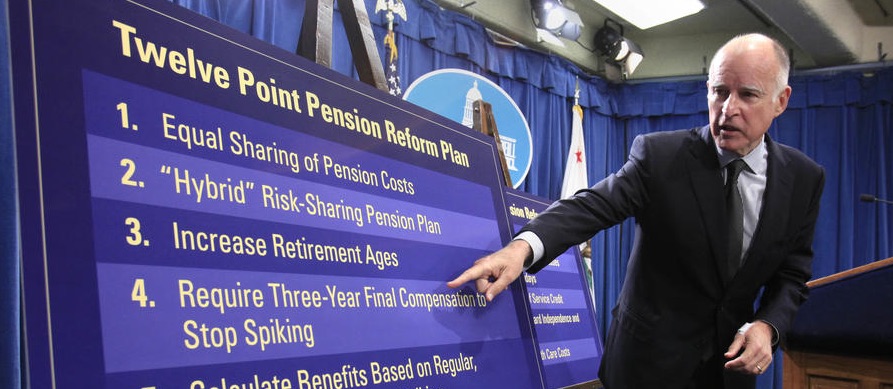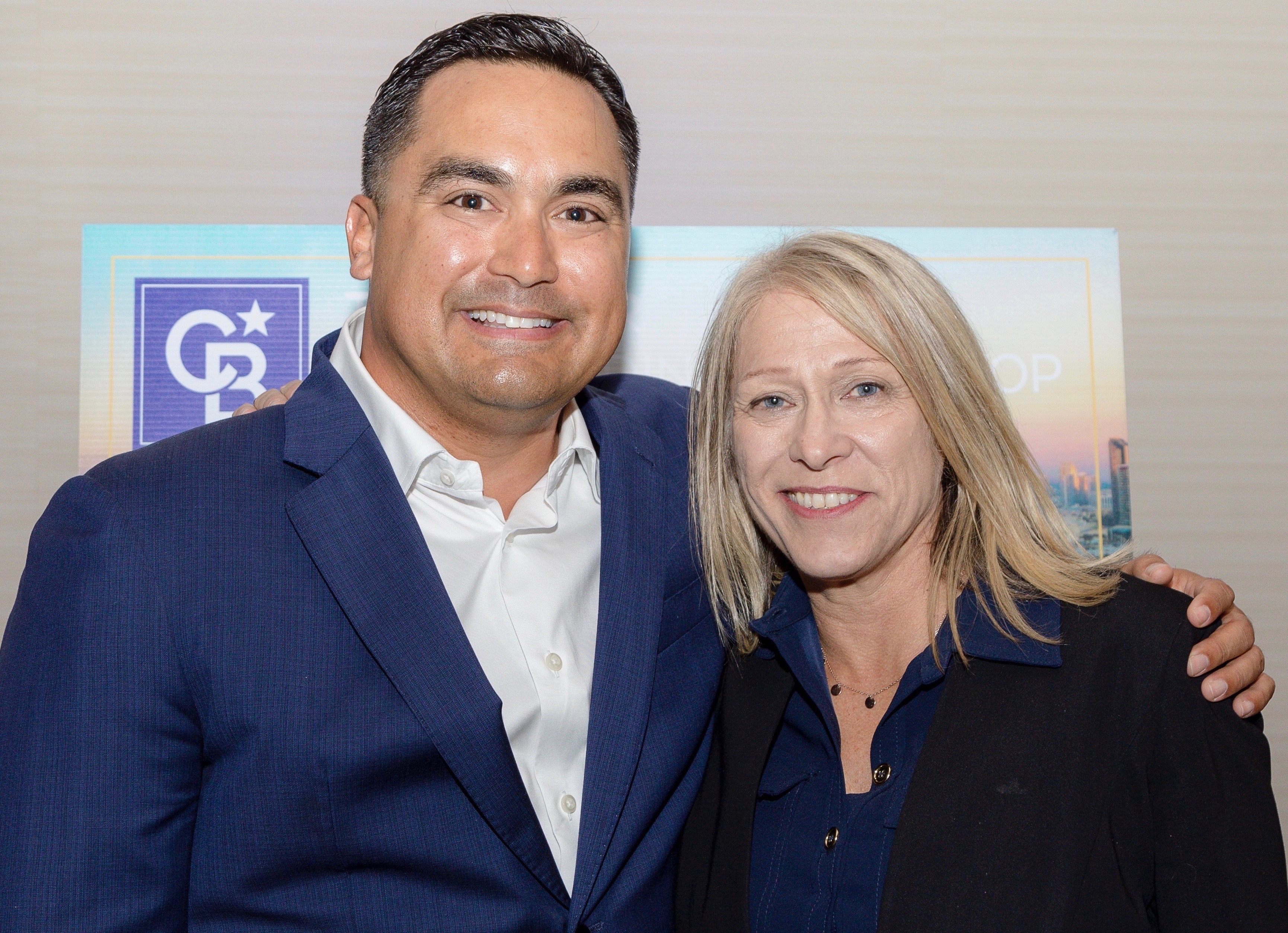Daily Business Report-Dec. 6, 2018
Gov. Jerry Brown has described pension reform as a ‘moral obligation.’ Here, he outlines his 12-point plan in October 2011. (AP)
Jerry Brown’s last stand on pension reform
The California Supreme Court is weighing a key legal precedent that could restore the generous pension formulas Brown worked so hard to tighten.
By Judy Lin | CALmatters
Six years ago, as California strained to emerge from the Great Recession, Gov. Jerry Brown worked a minor political miracle—a rebalancing of the massive state pension systems for public employees.
Shuttling between unions and the strapped governments on the hook for public sector benefits and paychecks, Brown scaled back some of the rules and perks that have made public sector workers more secure, arguing that the pain would be worth it. Results were mixed: The largest benefit rollback in state history yielded some savings, but not enough to entirely fix a pension commitment that taxpayers are increasingly finding hard to manage.
Now, as Brown prepares to leave office—his own pension at hand, after five decades in public service—even that hard-won modicum of fiscal change could be loosened. In a case that went to oral arguments this week, the California Supreme Court is weighing a key legal precedent that could restore the generous pension formulas Brown worked so hard to tighten.
Brown, who at 80 has already surpassed the average retirement age of state workers by 22 years, predicts that he’ll win. But Wednesday’s proceedings made it clear that workers’ arguments are also compelling.
Whatever the ruling, Brown’s successor, Gavin Newsom, will have to cope with the outcome. And—though the state’s unfunded liabilities persist, and economists warn another recession could be just around the corner—Newsom will face a very different political landscape. Should California land in another downturn, Brown’s pension reform miracle could be difficult, if not impossible to repeat.
The case heard by the high court on Wednesday involves the California Rule, a legal precedent that requires the state to compensate public employees if their retirement benefits are lessened. In a challenge brought by Cal Fire Local 2881, the firefighters union argues that the ability to purchase additional years of service credit toward retirement, known as “airtime,” is a pension benefit that employees rely on as part of their decision to go into public service.
Read more…
_____________________

USD honored by InfraGuard
for its cybersecurity efforts
Demonstrating its growing contributions to the region’s cybersecurity efforts, the University of San Diego received the Ties that Bind Award from InfraGuard on Dec. 2. InfraGuard, a partnership between the FBI and members of the private sector, recognized USD’s Cybersecurity Executive Course, offered in 2017 and 2018 by the university’s Center for Cyber Security Engineering and Technology in the Shiley-Marcos School of Engineering.
“The first-of-its-kind collaboration assembled the region’s largest cybersecurity stakeholders — homeland security (San Diego Office of Homeland Security) and the San Diego Law Enforcement Coordination Center); law enforcement (FBI), the private sector (InfraGuard) and academia (USD) — to strengthen the cybersecurity posture in the San Diego region,” said InfraGuard Executive Director Sandy Moul.
“These efforts would not have been possible without the the leadership of Engineering and Technology Outreach Director Jodi Waterhouse and Engineering and Technology Community Engagement Manager Mark Castellano,” said USD Shiley-Marcos School of Engineering Dean Chell Roberts.
The San Diego chapter of InfraGuard is the largest in the country with 2,100+members and a leader in innovative programming and community collaboration around critical security issues facing our region and nation.
_____________________
Perkins Coie law firm relocates office to Sorrento Valley
The Perkins Coie law firm announced that its San Diego office will relocate on Dec. 10 to 11452 El Camino Real, Suite 300, in Sorrento Valley. The firm’s new 37,000-square-foot space will accommodate the office’s recent and planned growth in its existing and additional practice areas.
Perkins Coie established an office in San Diego in June 2010 to serve the intellectual property needs of national and international clients with business in Southern California and support the firm’s growth strategy on the West Coast. The firm’s other West Coast offices are located in Los Angeles, Palo Alto, San Francisco, Portland, Seattle, and Bellevue, Wash.
The firm’s nearly 40 San Diego-based attorneys provide a full range of legal services to support industries at the epicenter of the market, including biotechnology, clean technology, telecommunications, defense, aerospace, electronics, software, energy, wireless technologies, and financial and business services.
_____________________
Workshop tonight for Parents:
How to start college prep for students in the sixth grade
Admissions coaches at e3 Civic High at the San Diego Central Library say that parents should start preparing their students for college admissions in the sixth grade. That’s why e3 Civic High is launching its first-ever “It Starts @ 6: Parent Workshop for College Prep” for parents of sixth, seventh, and eighth grade scholars tonight.
The free parent workshop for college prep will be held from 6 to 7:30 p.m. at e3 Civic High in the library at 395 11th Ave. in Downtown San Diego.
“At the workshop, we will share best practices for putting together a seven-year plan with parents of middle school students,” says Dr. Helen Griffith, executive director of e3 Civic High. “We’ll cover A-G coursework, PSAT, SAT, ACT assessments, financing for college, and discuss why getting a jump start on the admissions process will give their scholars a competitive edge.”
_____________________
Culture Report: Ethics (and women at the
front of San Diego’s taxidermy resurgence)
By Julie Dixon Evans | Voice of San Diego
In the wake of the recent ivory smuggling scandal at La Jolla’s Carlton Gallery, there’s something shocking in the reverence in the way the newest class of taxidermists — many of them young women — talk about animals, and their art. Simone Weinstein, co-owner of Little Dame Shop on Adams Avenue, came to taxidermy as an expression of art three years ago, when she and her business partner Katie Howard opened their shop. They offer regular creative workshops, including taxidermy.
“It’s an art form,” Weinstein explained on a quiet Saturday evening in the shop. A white rat with a leafy branch between its teeth stands mounted on its hind legs on the shelf behind her, nestled between feminist zines, curiosities and more taxidermy. “With taxidermy, I feel the reason why people get kind of put off with it is it that it looks like the animal,” Weinstein said, attributing much of the eeriness to the eyes. “I feel the reason why we’re interested in it is because we’re kind of scared of it,” she said.
_____________________
‘Trump insurance’ for the California environment
By Dan Morain | CALmatters
Senate President Pro Tem Toni Atkins of San Diego pointedly put her imprimatur on far-reaching state environmental legislation that would serve as a hedge against any environmental roll-back by President Donald Trump.
Atkins’ Senate Bill 1 —the first bill of the 2019-20 legislative session—would bar the state and local governments from adopting any law that is less stringent than what the federal clean air, water and other environmental laws and regulations were prior to Trump taking office in January 2017.
Democrat Sen. Henry Stern of Canoga Park, a co-author whose house was destroyed in the Woolsey fire, cited the impact of climate change and called the bill “Trump insurance.”
Not that California legislators will roll back state environmental law in any significant way. And with Democrats taking control of the U.S. House of Representatives in January, Congress is not likely to weaken environmental law.
But beware the lame duck session: Trump could seek legislation or regulation that might attempt to preempt state law, particularly on water and endangered species. That’s where the hedge comes in.
_____________________
Council committee votes approval
of UC San Diego fire station
The city of San Diego’s Public Safety and Livable Neighborhoods Committee has voted unanimously in favor of approving construction of a fire station on the University of California San Diego campus. The fire station, a first for the campus, would be built as a partnership between the city and UC San Diego, with the goal of serving the needs of the growing university, as well as the local surrounding community.
Members of the Public Safety and Livable Neighborhoods Committee who voted to approve the proposal included San Diego councilmembers Chris Cate, who serves as committee chair; Barbara Bry; and Georgette Gomez. Committee member and San Diego City Councilmember Lorie Zapf was not present for the vote.
A fire station on the UC San Diego campus would enable faster response times, providing vital emergency services that will benefit the UC San Diego community, as well as the many families and individuals who live in the surrounding community.
The proposal will next go before the entire San Diego City Council in January 2019.
_____________________
Hispanic state legislators open
national summit in Point Loma
The 16th National Summit of Hispanic State Legislators opens today and runs through Saturday at the Kona Kai Resort on Shelter Island in Point Loma. Latino state legislators from across the country will convene to focus on key priorities for Latino families.
The summit will gather senior elected officials, state legislators, members of Congress, community advocates, corporate executives, and policymakers to address some of the issues impacting Latino voters. Attendees will participate in panels to discuss a wide variety of issues, such as online privacy, the opioid crisis, cannabis decriminalization and policy, consumer trends and the future of retail, energy and climate change, the Jones Act, gun policy, the US Leadership Role in the Middle East, and sickle cells.
_____________________
John Fullmer named board chair
of San Diego Rescue Mission

The San Diego Rescue Mission has named John H. Fullmer as chairman of its board of directors. Fullmer, a resident of Rancho Santa Fe, spent more than 20 years at Cendant Corporation, helping to grow it from a start-up to a $15 billion+ multi-national public company.
In 1998, along with several colleagues, Fullmer started a venture capital company called eCom Partners, whose main investment focus was on Internet start-up companies. In 2001, he was named chairman/CEO of MyPoints, the largest, publicly-traded Internet loyalty company. After a period of time, this company was successfully sold to United Airlines.
Currently, Fullmer does private consulting with a number of companies, specializing in marketing and new business development.
_____________________

Preserving Poinsettia History
Most locals are familiar with the Ecke family, particularly its past as a locally owned family business that grew and sold poinsettias, and successfully marketed it as the holiday flower for Christmas all over the world. But thanks to the work being done at the Cal State San Marcos
University Library in collaboration with faculty and students in the history department, the story of the Ecke family from its origins in the region to its global effect on Christmas and agriculture continues to evolve.




